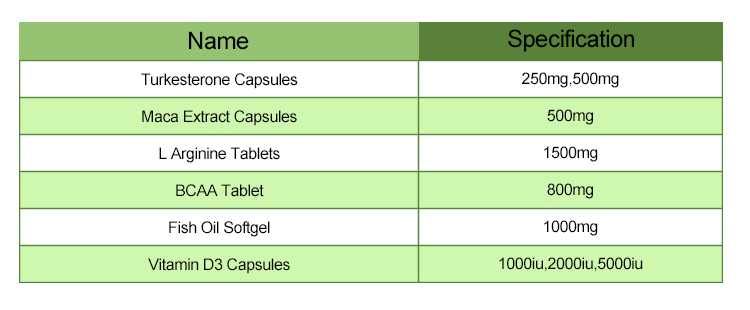Fish oil capsules typically contain omega-3 fatty acids, specifically eicosapentaenoic acid (EPA) and docosahexaenoic acid (DHA). These are essential fatty acids that the human body cannot produce on its own and must be obtained through diet or supplementation.
Chemical Structure of Fish Oil Capsules:
1.Eicosapentaenoic acid (EPA):
Chemical formula: C20H30O2
Structure: EPA is a 20-carbon fatty acid with five double bonds, located at positions 5, 8, 11, 14, and 17 from the methyl end.
2.Docosahexaenoic acid (DHA):
Chemical formula: C22H32O2
Structure: DHA is a 22-carbon fatty acid with six double bonds, located at positions 4, 7, 10, 13, 16, and 19 from the methyl end.

Physical Properties of Fish Oil Capsules:
Appearance: Fish oil capsules typically contain a transparent or slightly yellowish liquid enclosed in a gelatin or vegetarian capsule.
Odor: Fish oil may have a characteristic fishy odor, although some formulations are deodorized to reduce this smell.
Density: The density of fish oil is typically around 0.92 to 0.94 g/cm³.
Solubility: Fish oil is insoluble in water but soluble in organic solvents such as ethanol and chloroform.
Stability: Omega-3 fatty acids, particularly EPA and DHA, are prone to oxidation, which can lead to rancidity and the formation of unpleasant odors and flavors. Therefore, fish oil capsules often contain antioxidants such as vitamin E to maintain stability and prevent oxidation.
Nutritional Value: Fish oil is a rich source of omega-3 fatty acids, which have numerous health benefits, including supporting heart health, brain function, and reducing inflammation.
It’s important to note that the specific composition and physical properties of fish oil capsules may vary depending on the brand, formulation, and processing methods used.
The potential benefits of Fish Oil Capsules
Fish oil capsules are widely known for their potential health benefits due to their high content of omega-3 fatty acids, specifically eicosapentaenoic acid (EPA) and docosahexaenoic acid (DHA). Here are some of the potential benefits associated with fish oil capsules:
Heart Health: Omega-3 fatty acids, particularly EPA and DHA, are believed to have a positive impact on heart health. They can help reduce triglycerides, lower blood pressure, decrease inflammation, and prevent the formation of blood clots, all of which contribute to a lower risk of heart disease and stroke.
Brain Health: DHA, in particular, is a major structural component of the brain, making fish oil supplements potentially beneficial for cognitive function and reducing the risk of age-related cognitive decline. Some studies suggest that omega-3 fatty acids may also help in managing conditions like depression and anxiety.
Eye Health: DHA is also found in high concentrations in the retina of the eye. Adequate intake of omega-3 fatty acids may help prevent age-related macular degeneration, which is a leading cause of vision impairment and blindness in older adults.
Joint Health: Fish oil supplements have anti-inflammatory properties that can be beneficial for managing conditions like rheumatoid arthritis and osteoarthritis. They may help reduce joint pain, stiffness, and swelling, improving overall joint function and mobility.
Skin Health: Omega-3 fatty acids play a role in maintaining healthy skin by helping to regulate oil production, keeping the skin hydrated, and reducing inflammation. Some research suggests that fish oil supplements may alleviate symptoms of certain skin conditions like eczema and psoriasis.

Pregnancy and Infant Development: Omega-3 fatty acids are crucial for fetal brain and eye development during pregnancy. Pregnant women who consume adequate amounts of omega-3 fatty acids may have a lower risk of preterm birth and their babies may have better cognitive and visual development.
Immune System Support: Omega-3 fatty acids have been shown to modulate the immune response, potentially reducing inflammation and enhancing immune function. This can help the body better defend against infections and promote overall immune health.
Weight Management: Some studies suggest that omega-3 fatty acids may play a role in weight management by reducing appetite, increasing fat metabolism, and improving insulin sensitivity.
It’s important to note that while fish oil capsules offer these potential benefits, individual responses may vary, and they should be used as part of a balanced diet and healthy lifestyle. Additionally, it’s advisable to consult with a healthcare professional before starting any supplementation regimen, especially for individuals with pre-existing medical conditions or those taking medications.
